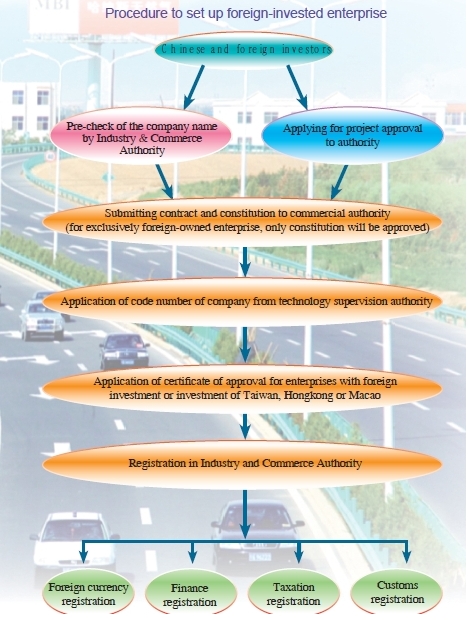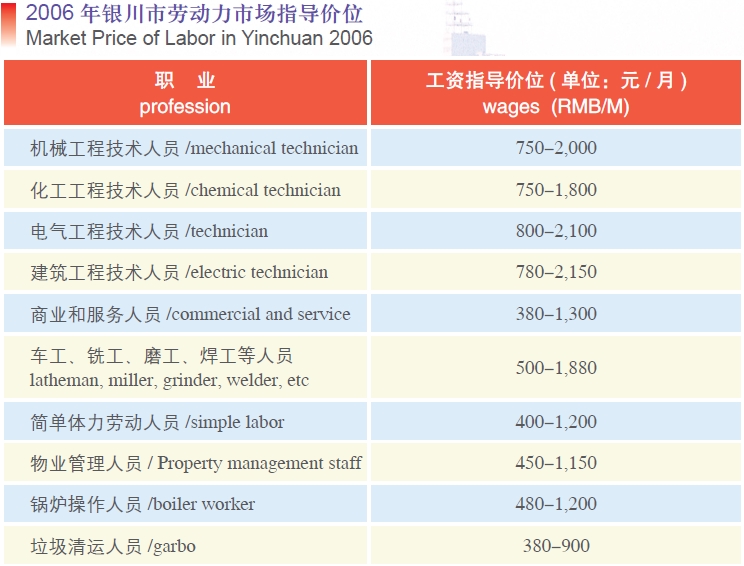III. Investment
i. Policy and Administrative Rules
Catalogue of Related Laws
Foreign Trade Law of the People’s Republic of China Customs Law of the People’s Republic of China Law of the People’s Republic of China on Import and Export Commodity Inspection Law of the People’s Republic of China on Chinese-Foreign Equity Joint Ventures Law of the People’s Republic of China on Chinese-Foreign Contractual Joint Ventures Law of the People’s Republic of China on Foreign-Capital Enterprises Company Law of the People’s Republic of China Law of the People’s Republic of China on the Entry and Exit Animal and Plant Quarantine Law of the People’s Republic of China on Control of the Entry and Exit of Aliens Law of the People’s Republic of China on the Control of the Exit and Entry of Citizens Securities Law of the People’s Republic of China Income Tax Law of the People’s Republic of China for Enterprises with Foreign Investment and Foreign Enterprises Individual Income Tax Law of the People’s Republic of China Law of the People’s Republic of China on the Administration of Tax Collection Environmental Protection Law of the People’s Republic of China Law of the People’s Republic of China on Evaluation of Environmental Effects Law of the People’s Republic of China on Promotion of Cleaner Production
List of Dominant Industries in Middle and Western Areas, Ningxia Autonomous
Region Section
The following is the list of dominant industries of attracting foreign investment in
Ningxia approved by the State Council in the List of Dominant Industries of Attracting
Foreign Investment in Middle and Western Areas (State Council Letter No.[2004]43):
1. The planting of wolfberry and its deep processing;
2. The development of follow-up industries of national key ecological projects, such as converting the cultivated land for forest and grass land, protecting the natural forest, etc;
3. The development and application of the techniques of water-saving irrigation;
4. The development of applied technique of processing coal and its production;
5. The production of carbon materials;
6. The building of high-quality grape wine base and grape wine making;
7. The deep processing of products made of potatoes;
8. The production and development of downstream chemical products of natural gas;
9. The production of polyvinyl chloride resin;
10. The production of meridian tyre;
11. The production of solid chip tantalum electrolytic condenser;
12. The construction and operation of the supply of gas, heat, and water and drainage network (the Chinese parties are the holding companies in the big and medium-sized cities);
13. The development of the tourist areas and spots and the construction, maintenance and operation of their facilities;
14. Highway passenger transportation.
ii. Procedure for Establishing Enterprises

Required Documents for Joint Venture and Cooperative Enterprises
1. Application by joint venture (cooperative enterprise).
2. Application of joint venture (cooperative project) and the documents issued by the department concerned after examination and approval.
3. Contract and constitution of joint venture (cooperative enterprise) signed by the members of rights and its authorized representatives from the joint venture (cooperative enterprise).
4. List of the chairman of the board, the vice chairman of the board and the directors of the board designated by the joint venture (cooperative enterprise).
5. Designation documents of the chairman of the board, the vice chairman of the board and the directors of the board designated by the joint venture (cooperative enterprise).
6. Copies of ID cards of the chairman of the board, the vice chairman of the board and the directors of the board designated by the joint venture (cooperative enterprise).
7. Business certificate and enrollment attestation of the joint venture (cooperative eEnterprise) among which the enrollment attestation or ID certificate of the foreign cooperative investor must be notarized by the notary office in his/her own country and authenticated by Chinese Embassy (consulate) in the country that the foreign cooperative investor comes from. Notarization document approved by the notary office is required for the certification of the qualifications and ID of the cooperative investor from Hong Kong, Macao and Taiwan.
8. Trust Deed of Authorization for Delivering Legal Documents signed between the foreign investor and the person who accepted the documents from Chinese Mainland.
9. Credit attestation and valid attestation documents of the members as of right of the joint venture (cooperative enterprise).
10. List of planned exported facilities and office supplies. Attestation from the department of land is required for large-scale expropriation.
12. Checking list of the name of the joint venture (cooperative enterprise) in advance (from the Industrial and Commercial Department).
13. Code number of enterprise obtained in advance ( from the technology supervision department).
Required Documents for Exclusively Foreign-owned Enterprises
1. Application by exclusively foreign-owned enterprise.
2. Application of exclusively foreign-owned enterprise and the documents issued by the department concerned after examination and approval.
3. Written reply from People's Government of county level or above county level where the enterprise is located.
4. Enterprise constitution signed by the member of right or the authorized member of right.
5. Registration and enrollment attestation of the foreign investor or other legal attestation documents. The enrollment attestation or ID certificate of the foreign investor must be not agitated by the notary office in his/her own country and authenticated by Chinese Embassy (consulate) in the country where the foreign investor comes from; Notarization document approved by the notary office is required for the certificate of the qualifications and ID of the investor from Hong Kong, Macao and Taiwan.
6. Trust Deed of Authorization for Delivering Legal Documents signed between the foreign investor and the person who accepted the documents from Chinese Mainland.
7. Credit attestation of the foreign investors and valid attestation document of its legal representatives.
8. Name list of the directors designated by exclusively foreign-owned enterprise9. Designation document of directors of the board of exclusively foreign-owned enterprise.
10. Copies of ID cards of members of the board designated by exclusively foreign-owned enterprise.
11. List of planned exported facilities and office supplies.
12. Checking list of the name of exclusively foreign-owned enterprise in advance (from the Industrial and Commercial Department).
13. Code number of enterprise obtained in advance (from the technology supervision department).
iii. Residence Environment
Urban Living Environment
Yinchuan, capital city of Ningxia, one of the most well known historic cities in China, is appointed as the major city along the Longhai economic zone of Euro-Asia continental bridge and central city of economic zone of Huhe-Baotou-Yinchuan-Lanzhou. At present, Yinchuan takes its goal to build “central city of modern area” with its brand of “shopping in Yinchuan”“, living in Yinchuan”, “educating in Yinchuan”, “traveling in Yinchuan” and “honoring Yinchuan,” etc, and it has turned in to one of the “China 50 honorable and safety zones of investment environment” and the beautiful and functional and most available for careers and living city in northwest area.
Medical & Sanitation By the end of 2005,Ningxia has 1,463clinics of all kinds with 17,802 beds involving in 22,817 medical technicians, amongwhich,10,586 are certified doctors and certified assistant doctors,7,376 registered nurses. It has built up 35 epidemic prevention organizations with 1,530 staff, 21 maternal and child health organizations with 1,336staff, 266 rural sanitary hospitals with 3,434staff.
iv. Reference Prices of Basic Elements

Related Articles:
Doing Business in Ningxia Hui Autonomous Region of China: I. Survey
Doing Business in Ningxia Hui Autonomous Region of China: II. Economy
Doing Business in Ningxia Hui Autonomous Region of China: IV. Development Zone





